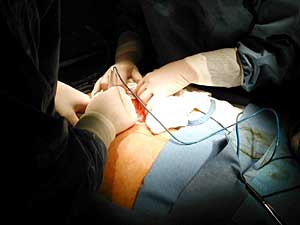|
Audio
Photos
Resources
|
January 19, 2005
State officials say at least 20 patients have died in Minnesota hospitals in the last couple of years because of medical errors. The first-of-its-kind report by the state Health Department lists serious medical errors and poor care that occurred between July 2003 and October of last year. Health care officials say they hope it pushes hospitals to improve treatment.
St. Paul, Minn. — No other state has taken such a comprehensive look at the scope of medical errors in its licensed hospitals. The groundbreaking study documented 99 problems at 30 hospitals in Minnesota over 16 months. It's hard to say whether those numbers are good or bad since there's nothing to compare them to. But health care officials hope the report will force hospitals to improve the way they treat patients.
State Health Commissioner Diane Mandernach says hospitals will be able to improve treatment when they know which mistakes have been made.
"One medical error is one too many, yet Minnesotans should know and take comfort in knowing that hospital officials and health care officials are doing more than ever to prevent medical errors," she said.
In addition to the 20 deaths, the report says hospitals operated on the wrong body part 13 times. Surgeons also operated on the wrong patient once and performed the wrong procedure five times. The most common mistake was leaving a foreign object in a patient; that happened 31 times.
William Jacott, an associate professor at the University of Minnesota's Medical School, says the numbers need to be kept in perspective. Jacott notes the surgery problems listed amount to a small fraction of the 450,000 surgeries performed at 23 hospitals where surgery problems were reported.
"We aren't going to leave hospitals because they have high numbers of adverse events. None of these numbers are high when you look at all of the interaction that has occurred at the hospitals but we welcome the fact that it will be a safer place for our patients," Jacott said.
St. Luke's Hospital in Duluth had the most deaths because of adverse events with four. Fairview University Medical Center in Minneapolis had the highest number of errors with 13.
The Minnesota Hospital Association's Bruce Rueben says the public should not use the report to choose a hospital. He says his members pushed for the report to help them improve treatment. Rueben says hospital officials will be more receptive to changing treatment practices if they find that other hospitals are reporting similar errors.
"If a hospital only had its own experience to draw from, it might only have one of these and might incorrectly assume that a surgeon made a mistake. But in looking in the fact that these happened across other hospitals, it became clear that it was in the steps of care that something needed to change," according to Rueben.
Rueben says hospitals have already taken steps to address some of the mistakes. He says, for instance, that surgeons are taking the time to discuss patient's surgeries with other staff so all agree on how to handle the procedure. Some hospitals are also marking body parts so hospitals don't operate on the wrong body part.
The Minnesota report suggests medical error problems aren't as widespread as more general studies have suggested. One study by the Institute of Medicine says deaths because of errors could number between 44,000 and 98,000 each year nationwide.
Michael Scandrett, a health consultant with Halleland Health Consulting in Minneapolis, says future reports will help consumers decide whether hospitals are making strides to improve patient care. Scandrett says consumers don't have much information right now to decide which health care providers provide adequate care.
"We're going to get to the point where we can really use this information as we choose which doctors to go to, which clinics to go to, what hospitals we should receive procedures in," Scandrett said. "It's not just us individually, but it's also going to provide information to health plans and government programs and employers so they can make sure that people are getting the best quality care."
The Health Department says future reports will also include serious medical errors that have occurred at outpatient surgical centers in addition to those that occur in hospitals.





